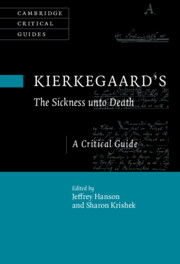Book contents
- Kierkegaard’s The Sickness unto Death
- Cambridge Critical Guides
- Kierkegaard’s The Sickness unto Death
- Copyright page
- Contents
- Contributors
- Acknowledgments
- Abbreviations
- Introduction
- Chapter 1 Kierkegaard’s Place of Rest
- Chapter 2 Publishing The Sickness unto Death
- Chapter 3 Kierkegaard on the Self and the Modern Debate on Selfhood
- Chapter 4 From Here to Eternity
- Chapter 5 Kierkegaard’s Metaphysics of the Self
- Chapter 6 The Experience of Possibility (and of Its Absence)
- Chapter 7 Sin, Despair, and the Self
- Chapter 8 Sin and Virtues
- Chapter 9 Despair as Sin
- Chapter 10 Fastening the End and Knotting the Thread
- Chapter 11 Despair the Disease and Faith the Therapeutic Cure
- Chapter 12 The Long Journey to Oneself
- Chapter 13 Accountability to God in The Sickness unto Death
- Bibliography
- Index
- Cambridge Critical Guides
Chapter 9 - Despair as Sin
The Christian and the Socratic
Published online by Cambridge University Press: 26 August 2022
- Kierkegaard’s The Sickness unto Death
- Cambridge Critical Guides
- Kierkegaard’s The Sickness unto Death
- Copyright page
- Contents
- Contributors
- Acknowledgments
- Abbreviations
- Introduction
- Chapter 1 Kierkegaard’s Place of Rest
- Chapter 2 Publishing The Sickness unto Death
- Chapter 3 Kierkegaard on the Self and the Modern Debate on Selfhood
- Chapter 4 From Here to Eternity
- Chapter 5 Kierkegaard’s Metaphysics of the Self
- Chapter 6 The Experience of Possibility (and of Its Absence)
- Chapter 7 Sin, Despair, and the Self
- Chapter 8 Sin and Virtues
- Chapter 9 Despair as Sin
- Chapter 10 Fastening the End and Knotting the Thread
- Chapter 11 Despair the Disease and Faith the Therapeutic Cure
- Chapter 12 The Long Journey to Oneself
- Chapter 13 Accountability to God in The Sickness unto Death
- Bibliography
- Index
- Cambridge Critical Guides
Summary
This chapter presents the second part of The Sickness unto Death, “Despair as Sin,” as the Aufhebung or recontextualizing of the first part in which the concept of sin does not function. Both parts portray the self as existing “before God,” but that concept is so indeterminate in the first part that it fits just as well with Spinoza’s or Hegel’s “God” as with the biblical God Kierkegaard has in mind. Sin, along with essentially related concepts such as atonement and forgiveness, is the decisive category that distinguishes biblical religion (Jewish or Christian) from “theologies whose foundations are scientific naturalism (Spinoza) or socio-historical pantheism (Hegel). The latter are “Socratic” in that they rely on some version of recollection theory (Reason), while the former rests on a concept of revelation that is not reducible to a truth already within us. Reason turns out to be as sectarian as the faith that rests on some extra-rational revelation. While both parts of the text are psychological/phenomenological, neither permits the reduction of despair to depression.
- Type
- Chapter
- Information
- Kierkegaard's The Sickness Unto DeathA Critical Guide, pp. 148 - 166Publisher: Cambridge University PressPrint publication year: 2022
- 1
- Cited by

